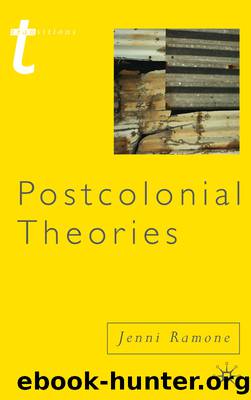Postcolonial Theories by Ramone Jenni.;

Author:Ramone, Jenni.;
Language: eng
Format: epub
ISBN: 9780230345324
Publisher: Bloomsbury UK (Minor Textbooks)
Fanon and psychopathology
As a psychiatrist, Fanonâs concern with language and identity was in the context of psychopathology. Fanonâs proposition is that the uncertainty of identity arising from the mastery of a new language has a direct impact on the psyche. He also asserts that this is a direct result of the unstable sense of identity formulated in the colonial West Indies, which differs from the colonial encounter in other places, where there was an existing, long-established language and culture; the Caribbean was, of course, different as the colonization of that territory involved bringing African slaves from all over the continent to work on plantations, and the descendents of those slaves formed the communities but had only a ruptured history to look back on, and the new common language of Creole, developed in the context of slavery. There is a contrast with other colonies, such as India. Initially, India was governed using existing laws, enabled by expert Orientalist translators like William Jones (discussed in Chapter 3 of this book). After Macaulayâs Minute of 1835, an official edict which insisted that all education should thenceforth be conducted through the medium of the English language and using English literature, the aim was to instil a notion of British superiority and to ignore South Asian literature, art and history in favour of the study of European alternatives. The English education process thereby operated in a resistant relationship with South Asian history and culture. For the black Antillean, in the first generations after the Atlantic slave passage, there was no single, solid cultural position from which to resist French education, meaning the black West Indian schoolchild grew up with a white European sense of self which was contradicted by black skin and a distant yet shared heritage with the black African. This was compounded by an unequal relationship between races, based on a prejudice that Fanon defines as an inferiority complex developed in the black Antillean and a sense of dependency upon the white European expounded by the colonizer. For Fanon, psychoanalysis offers an opportunity to address socially motivated pathologies in both black and white people.
In tone, Black Skin, White Masks does not always read like a political manifesto, an academic study, or a psychological enquiry, though it is to a certain extent all of those things. Fanon discards a rigid methodological framework in favour of an uninhibited observational style. In so doing, he implies that established methods are counterproductive if they demand working within rigid frameworks in order to address a new question. He also rejects rigidity in terms of writing structure, employing a personal, poetic style from the beginning of the book, when he outlines the vicious circle that he wishes to eliminate:
There is a fact: White men consider themselves superior to black men.
There is another fact: Black men want to prove to white men, at all costs, the richness of their thought, the equal value of their intellect.
How do we extricate ourselves? (1986, p. 12)
The first three chapters deal with black people in âthe white worldâ as a result of migration, usually enforced by a heritage of slavery.
Download
This site does not store any files on its server. We only index and link to content provided by other sites. Please contact the content providers to delete copyright contents if any and email us, we'll remove relevant links or contents immediately.
Asking the Right Questions: A Guide to Critical Thinking by M. Neil Browne & Stuart M. Keeley(5355)
Autoboyography by Christina Lauren(5086)
Dialogue by Robert McKee(4160)
Eat That Frog! by Brian Tracy(4149)
Sticky Fingers by Joe Hagan(3911)
Journeys Out of the Body by Robert Monroe(3460)
Annapurna by Maurice Herzog(3296)
Full Circle by Michael Palin(3268)
Elements of Style 2017 by Richard De A'Morelli(3235)
Schaum's Quick Guide to Writing Great Short Stories by Margaret Lucke(3186)
The Art of Dramatic Writing: Its Basis in the Creative Interpretation of Human Motives by Egri Lajos(2857)
The Diviners by Libba Bray(2800)
Why I Write by George Orwell(2773)
The Mental Game of Writing: How to Overcome Obstacles, Stay Creative and Productive, and Free Your Mind for Success by James Scott Bell(2766)
In Patagonia by Bruce Chatwin(2755)
Atlas Obscura by Joshua Foer(2704)
The Fight by Norman Mailer(2699)
Venice by Jan Morris(2430)
The Elements of Style by William Strunk and E. B. White(2376)
